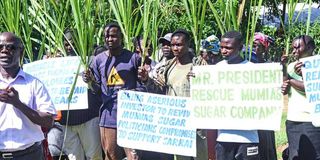End sugar farmers’ woes

A protest by former Mumias Sugar staff on May 10, 2023.
The struggles of Mumias Sugar Company, one of Kenya’s most renowned millers, have been a matter of concern for years with far-reaching implications on not only the industry but also thousands of farmers’ lives and livelihoods.
A key cause of its ruin is the mismanagement of resources and questionable decisions. Its assets—vast land, factory, 1,500 houses, club and water plant—were leased to a receiver on behalf of KCB Bank at Sh19.5 million monthly yet the miller owes billions of shillings in loans, salary arrears and others.
Mumias Sugar initially sought to empower farmers by financing their operations. But lack of sustainable farming practices, mismanagement of funds and misguided projects eroded their trust in it. Many have abandoned sugarcane due to non-payment.
Its fall coincided with new technology—specifically the diffuser, which can crush 8,000 tonnes of cane a day. But selling off of the older mills was detrimental; without sufficient cane supply, even the most advanced machinery cannot sustain a sugar factory.
Government intervention, including pumping in billions of shillings in bailout, was in vain as it was mismanaged and diverted to non-core projects.
The future of Mumias Sugar, now under the Sarrai Group, remains uncertain. Concerns include the group’s intentions and commitment to the revival of the industry amid claims that it imports sugar for repackaging, besides unsafe working conditions.
To revive Mumias Sugar and the industry in western Kenya, there is a need for transparent and accountable management that prioritises revival and good governance. Secondly, rebuild trust with farmers by addressing their concerns and providing financial support and training. Thirdly, create an enabling environment for the industry—policy reforms, market access and financing.
Improve productivity
The farmers should be encouraged to adopt modern, sustainable techniques to improve productivity, minimise environmental impact and ensure long-term viability. Collaboration with all stakeholders—such as farmers, millers, government agencies and local communities—will foster open dialogue, enhance cooperation and help to develop viable solutions.
Review the zoning of farms advocated by Mumias Sugar. With many farmers having been contracted by other millers and made significant investments in their farms, for now, it would only exacerbate the challenges of farmers and millers. Disrupting the contractual agreements would undermine the financial investments by millers in the farms.
Instead, focus on revitalising the entire industry in western Kenya. That entails supporting and incentivising farmers to increase cane production, rehabilitating Mumias Sugar infrastructure and exploring partnerships with the other millers.
Address Mumias Sugar's debts and liabilities, including the lease of assets and financial transparency. Thoroughly investigate the alleged mismanagement of resources and financial improprieties to hold culprits to account and prevent a recurrence. Select partners or investors based on their track record, financial capabilities and long-term vision for the sustainable growth of the company and industry.
The revival of the miller and the resolution of sugar farmers’ challenges call for a comprehensive and collaborative effort. By addressing mismanagement, promoting sustainable farming practices, rebuilding trust with farmers and fostering partnerships, the industry can once again become vibrant and economically viable. But that should not be at the expense of farmers and millers, who have invested time, resources and money in the farms.
Ms Mataga is a business intelligence analyst. [email protected].




